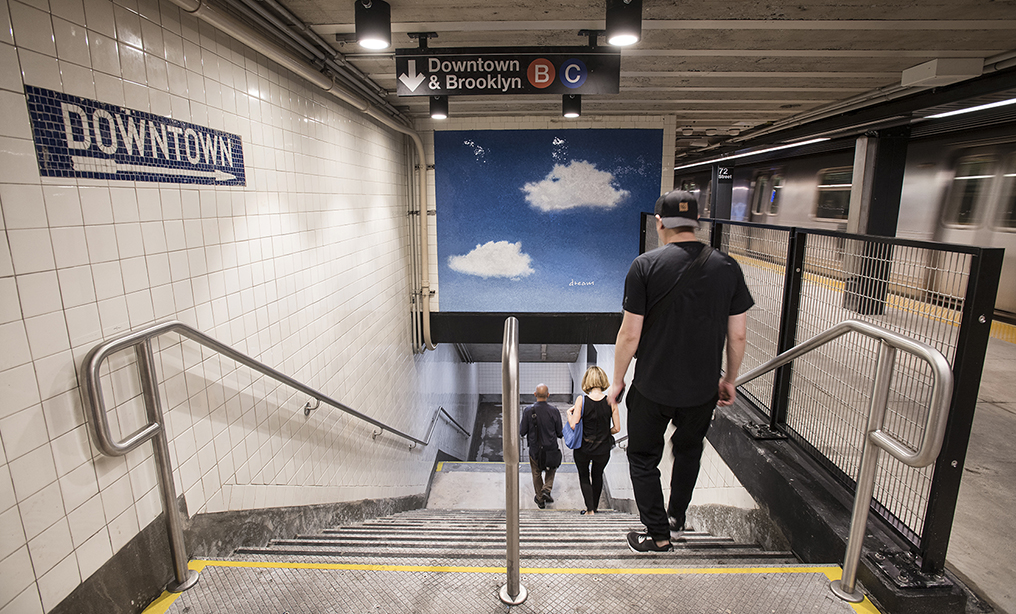Disability Advocates File Class Action, Stepping Up Legal Push for MTA Transit Accessibility
Following a summary judgment in their favor in March, disability advocates are now pushing for a systemwide decision to force the transit agency to honor federal access requirements.
May 15, 2019 at 03:47 PM
3 minute read
 A newly renovated subway station at 72 Street. Some three-quarters of stations in NYC subway system are inaccessible to people with disabilities. Photo: MTA/Flickr
A newly renovated subway station at 72 Street. Some three-quarters of stations in NYC subway system are inaccessible to people with disabilities. Photo: MTA/Flickr
Disability advocates seek to bring the Metropolitan Transportation Authority to task over what they claim is a systemic failure to build required accessibility features into rehabilitated stations.
Advocates filed the class action suit in the Southern District of New York on Wednesday, following a significant legal win for many of the same groups in March. In that decision granting partial summary judgment for the plaintiffs, U.S. District Judge Edgardo Ramos of the Southern District of New York found the agency was required under the Americans with Disabilities Act to include reasonable accessibility improvements when stations were being redone, regardless of the cost, and should have done so during a rehabilitation project in the Bronx.
Following the partial summary judgment order, the suit has moved towards discovery, with expert reports and exhibitions scheduled through the end of July.
The office of the U.S. Attorney Geoffrey Berman of the Southern District of New York is an intervenor in the suit. Following Ramos' ruling in favor of the disability advocates, Berman said the MTA was “on notice” for including accessibility improvements like elevators in station improvements.
A spokesman for the U.S. attorney's office declined to comment on the office's intentions regarding the latest suit.
Advocates now hope to win a similar result, only across the nation's largest public transit system.
“The MTA's actions clearly demonstrate that they value amenities like Wi-Fi over serving passengers with disabilities,” Michelle Caiola, managing director of litigation for one of the plaintiffs. “MTA has a longstanding pattern of ignoring their ADA obligations when altering stations, harming not only those with disabilities, but all New Yorkers who benefit from elevator access, including parents with strollers and senior citizens. Its disregard and negligence should no longer be tolerated.”
The suit claims the MTA has an “ongoing discriminatory practice of renovating New York City subway stations without installing elevators or other stair-free routes in blatant violation” of the ADA. Advocates and transit users with mobility disabilities have been pushing “for decades” for the transit authority on making accessibility improvements to stations during renovations, according to the complaint.
Advocates claims some three-quarters of stations in the New York City subway system are inaccessible to people with disabilities. This, they say, despite decades of renovations at stations where ADA-required accessibility improvements should have been included.
A spokesman for the MTA did not immediately respond to a request for comment.
Joining DRA's legal team for the plaintiffs is Sheppard, Mullin, Richter & Hampton partner Daniel Brown.
Related:
MTA 'On Notice' of Need for Disability Act Compliance in Wake of Loss in Lawsuit
NY Lawmakers Plan to Address Surge in ADA Website Accessibility Suits
2nd Circuit, in First Impression, Aligns ADA and Rehab Act Claims
This content has been archived. It is available through our partners, LexisNexis® and Bloomberg Law.
To view this content, please continue to their sites.
Not a Lexis Subscriber?
Subscribe Now
Not a Bloomberg Law Subscriber?
Subscribe Now
NOT FOR REPRINT
© 2025 ALM Global, LLC, All Rights Reserved. Request academic re-use from www.copyright.com. All other uses, submit a request to [email protected]. For more information visit Asset & Logo Licensing.
You Might Like
View All

Courts Beginning to Set Standards for Evidence Relying Upon Artificial Intelligence
4 minute read
NY Judge Admonished Over Contributions to Progressive Political Causes

Attorneys ‘On the ‘Move: Morrison Cohen Expands White Collar Practice; O’Melveny Brings Back Corporate Finance Partner
6 minute readTrending Stories
- 1'It's Not Going to Be Pretty': PayPal, Capital One Face Novel Class Actions Over 'Poaching' Commissions Owed Influencers
- 211th Circuit Rejects Trump's Emergency Request as DOJ Prepares to Release Special Counsel's Final Report
- 3Supreme Court Takes Up Challenge to ACA Task Force
- 4'Tragedy of Unspeakable Proportions:' Could Edison, DWP, Face Lawsuits Over LA Wildfires?
- 5Meta Pulls Plug on DEI Programs
Who Got The Work
Michael G. Bongiorno, Andrew Scott Dulberg and Elizabeth E. Driscoll from Wilmer Cutler Pickering Hale and Dorr have stepped in to represent Symbotic Inc., an A.I.-enabled technology platform that focuses on increasing supply chain efficiency, and other defendants in a pending shareholder derivative lawsuit. The case, filed Oct. 2 in Massachusetts District Court by the Brown Law Firm on behalf of Stephen Austen, accuses certain officers and directors of misleading investors in regard to Symbotic's potential for margin growth by failing to disclose that the company was not equipped to timely deploy its systems or manage expenses through project delays. The case, assigned to U.S. District Judge Nathaniel M. Gorton, is 1:24-cv-12522, Austen v. Cohen et al.
Who Got The Work
Edmund Polubinski and Marie Killmond of Davis Polk & Wardwell have entered appearances for data platform software development company MongoDB and other defendants in a pending shareholder derivative lawsuit. The action, filed Oct. 7 in New York Southern District Court by the Brown Law Firm, accuses the company's directors and/or officers of falsely expressing confidence in the company’s restructuring of its sales incentive plan and downplaying the severity of decreases in its upfront commitments. The case is 1:24-cv-07594, Roy v. Ittycheria et al.
Who Got The Work
Amy O. Bruchs and Kurt F. Ellison of Michael Best & Friedrich have entered appearances for Epic Systems Corp. in a pending employment discrimination lawsuit. The suit was filed Sept. 7 in Wisconsin Western District Court by Levine Eisberner LLC and Siri & Glimstad on behalf of a project manager who claims that he was wrongfully terminated after applying for a religious exemption to the defendant's COVID-19 vaccine mandate. The case, assigned to U.S. Magistrate Judge Anita Marie Boor, is 3:24-cv-00630, Secker, Nathan v. Epic Systems Corporation.
Who Got The Work
David X. Sullivan, Thomas J. Finn and Gregory A. Hall from McCarter & English have entered appearances for Sunrun Installation Services in a pending civil rights lawsuit. The complaint was filed Sept. 4 in Connecticut District Court by attorney Robert M. Berke on behalf of former employee George Edward Steins, who was arrested and charged with employing an unregistered home improvement salesperson. The complaint alleges that had Sunrun informed the Connecticut Department of Consumer Protection that the plaintiff's employment had ended in 2017 and that he no longer held Sunrun's home improvement contractor license, he would not have been hit with charges, which were dismissed in May 2024. The case, assigned to U.S. District Judge Jeffrey A. Meyer, is 3:24-cv-01423, Steins v. Sunrun, Inc. et al.
Who Got The Work
Greenberg Traurig shareholder Joshua L. Raskin has entered an appearance for boohoo.com UK Ltd. in a pending patent infringement lawsuit. The suit, filed Sept. 3 in Texas Eastern District Court by Rozier Hardt McDonough on behalf of Alto Dynamics, asserts five patents related to an online shopping platform. The case, assigned to U.S. District Judge Rodney Gilstrap, is 2:24-cv-00719, Alto Dynamics, LLC v. boohoo.com UK Limited.
Featured Firms
Law Offices of Gary Martin Hays & Associates, P.C.
(470) 294-1674
Law Offices of Mark E. Salomone
(857) 444-6468
Smith & Hassler
(713) 739-1250






